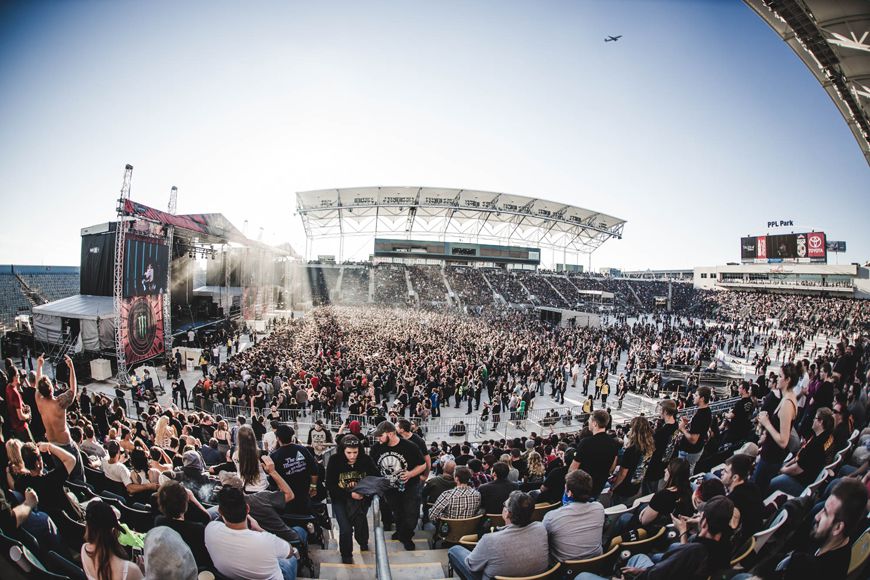Jordan Fish, Bring Me The Horizon
UPDATE 11/19: We’re thrilled to share that for the second year in a row, Bring Me the Horizon has been nominated for a Grammy, this time in the “Best Rock Album” category for their provocative new album “amo.” It features some go-to demos for SVS and has created quite a stir in the metal/rock scene so we’re really pulling for them to win!
Fresh off of the release of their groundbreaking album “That’s the Spirit” and currently selling out venues across the U.S. and Europe, Bring Me The Horizon has been called one of the most forward thinking metal bands in the world. As it has grown, BMTH has undergone a musical progression from its earliest days as a metalcore band, in large part because of the production talents of Jordan Fish.
Much like adding new equipment to an audio system can heighten the performance to new levels, bringing new talent into a band can provide a shake-up to inspire creativity. Since joining BMTH in 2012, Jordan has been a major influence on the band’s sound inspiring many of the edgy guitar riffs and other elements on the previous album “Sempiternal”. His music production fingerprints can be found all over “That’s the Spirit”, which offers a stylistic departure from the metalcore genre.
When Fish decided to upgrade his home audio system, he needed something that was capable of producing crisp, clear audio playback, even when played at live concert sound levels. It also had to present an aura of authority without taking over the room visually. After speaking with Karma AV (SVS’s authorized partner for the UK), Fish opted for a pair of SVS Ultra Bookshelf speakers, which now headline the main audio system in his home and impressed him so much, they were used in the production of BMTH’s newest album.
Fish took some time away from performing and producing to speak with SVS about BMTH’s progression, listening at concert levels and the current state of audio.
Questions And Answers:
You had a big role in producing Bring Me the Horizon’s most recent album, “That’s the Spirit”. What was that experience like?
We’ve always had artistic freedom to explore different styles of music on our albums and never felt constrained, so it was really about having a strong idea of what we wanted to achieve but not really having a middle man to run things through. Oli [lead singer] has an incredible amount of energy and passion, but it was psychologically draining for both of us because we poured so much of ourselves into getting every song exactly right. Lyrics, hooks, everything was scrutinized because we wanted to produce an album that was stronger than anything we’ve ever done before.
Who are some artists that have influenced you personally and the band?
For me, it was that wave of new metal from bands like the Deftones, Linkin Park, and Slipknot, but also bands like Radiohead which really got me into a whole new realm of electronic music. For BMTH, it’s trickier because they had a long history from before I was there. It’s definitely been a progression from death metal and hardcore to a much broader sound with electronic and pop influences. It’s funny, as a band, we have a pretty unique set of interests and musical talents that includes Metal, Hip Hop, Blues guitar, techno and more. All of these influences combine to make the sound what it is.
About that progression, what has been the reaction from fans and internally?
It’s been really good. With both the last two albums – we knew it would be divisive, and we knew we’d lose and gain some people, but the album has really taken off so we all feel good about the direction and our creative choices.
When you get to a certain age, your palette of sound changes in terms of what you like and what you listen to. We wanted to write an album that reflected what we were listening to, with our own signature. BMTH music has really been a reflection of where the band was at a given time. It went from young kids going crazy, to a party vibe and then to a darker place with “Sempiternal”, but “That’s the Spirit” is definitely a bit more euphoric and uplifting.
How would you describe your role in Bring Me The Horizon?
I’m not a musician in the traditional sense of mastering an instrument. I play keyboard live and play a bit of bass, but my real instrument is a laptop with Pro Tools that I use to write songs and engineer multiple layers of instrumentals, sounds and vocals into something people enjoy listening to. If I think a harp fits within a certain track, or a saxophone adds texture, I write out the part and blend it all together. With music evolving the way it is, this process really defines what an album ultimately sounds like.

BMTH’s music has a lot of energy, why is it important to have good speakers when listening at concert level volumes?
When I put on music, I like to listen properly and buzz off it. You can’t play shitty speakers loud or they sound awful. One of the things I love about SVS is that I can dial up the volume but still get all the clarity and dynamics without it sounding harsh. When you have electric guitars, drums, synthesizer beats and vocals all competing for attention, it’s easy to lose the nuance and just hear noise. Great speakers are much more revealing of the skill that goes into music production.
What’s your take on the current state of high performance audio?
I really feel like high fidelity audio is having a resurgence. People are starting to realize that listening to music in a good environment with good speakers is a just better experience overall and not just because they’re being told it’s true. Vinyl is coming back, which shows that people are starting to value sound quality over convenience more and it’s good to see some higher quality streaming services having success. Listening off a good system adds energy and precision you don’t get with lesser speakers.
I mean, there’s always been HiFi that catered to the high end with gear that was way out of most people’s price range. Its companies like SVS that are really driving the resurgence. It’s that same level of high-end performance, but affordable.
How has SVS helped shape that opinion?
My first impression of the Ultra Bookshelf speaker was that it looked and felt crazy expensive – like the physical feel and weight impressed me. Even though it wasn’t planned, we actually used them during the process of writing and recording “That’s the Spirit”. Studio Monitors are designed to be as flat as possible, often to the detriment of the listening experience. We still had to use the monitors for some critical listening, but the Ultra Bookshelf speakers offered good balance and were accurate enough to use as monitors themselves. The benefit was they weren’t cold or harsh like a typical monitor speaker. We all preferred the sound of the Ultras during playback because they just had better dynamics and conveyed what we were going for on the album more effectively.
What projects are you working on now? Any updates you want to share?
We’re currently on tour in the U.S., playing in Denver tonight and then heading further out west before going back through Europe, the UK and Russia, finishing up in December. It’s really been BMTH’s best tour ever. We’re selling out bigger venues than we’ve ever played before so we’re all feeling pretty good right now. It’ll be good to re-charge a bit in the new year, but we’ll be back in the States in March for several more shows.

SVS Featured Producer: Ben Bloomberg, Co-Founder, Advanced Sonic Alert Technologies

SVS Featured Producer: Michael Lewis, The Song Mill Studios

SVS Featured Producer: Matt Yocum, Movie and TV Sound Engineer
Share Your Thoughts







